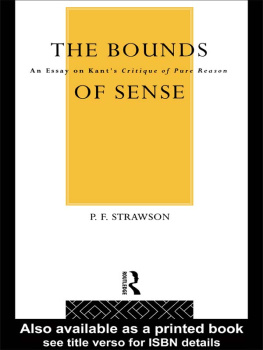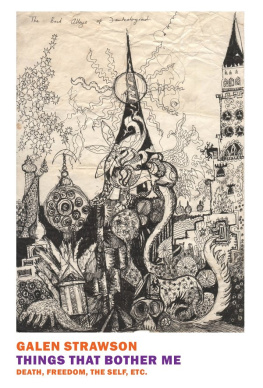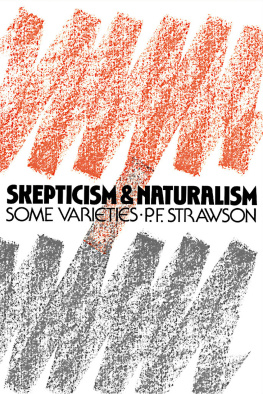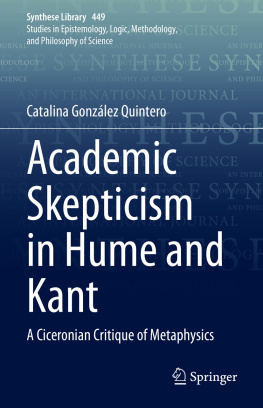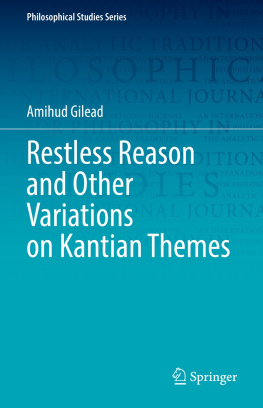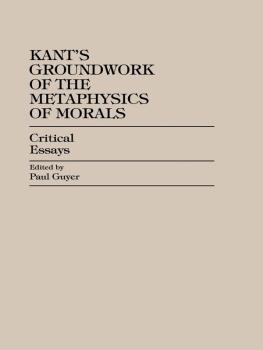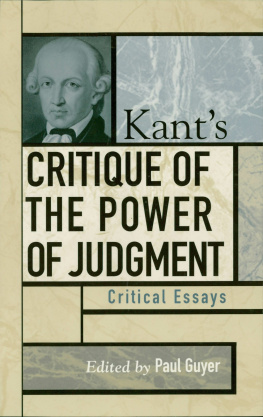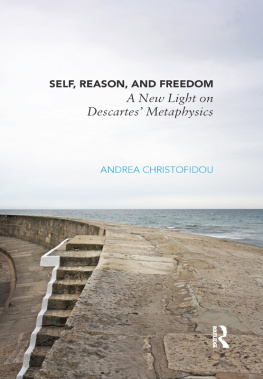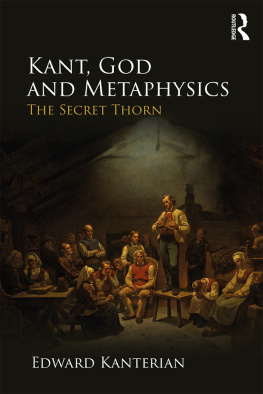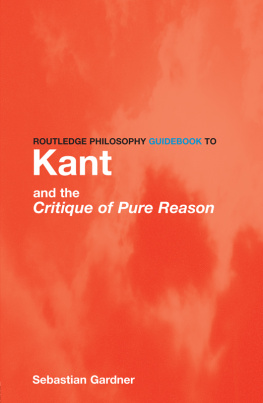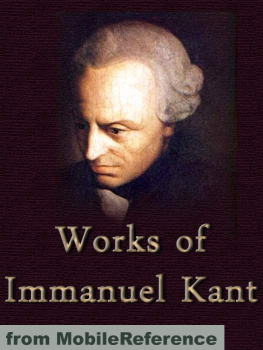P. F. STRAWSON
To purchase your own copy of this or any of Taylor & Francis or Routledges collection of thousands of eBooks please go to http://www.ebookstore.tandf.co.uk/.
PREFACE
This book originated in lectures on Kants Critique of Pure Reason given in alternate years from 1959 onwards in the University of Oxford. As any Kantian scholar who may read it will quickly detect, it is by no means a work of historical-philosophical scholarship. I have not been assiduous in studying the writings of Kants lesser predecessors, his own minor works or the very numerous commentaries which two succeeding centuries have produced. I have written for those students of the Critique who, like myself, have read and re-read the work with a commingled sense of great insights and great mystification. I have tried to present a clear, uncluttered and unified interpretation, at least strongly supported by the text as it stands, of the system of thought which the Critique contains; I have tried to show how certain great parts of the structure can be held apart from each other, while showing also how, within the system itself, they are conceived of as related; I have tried to give decisive reasons for rejecting some parts altogether; and I have tried to indicate, though no more than indicate, how the arguments and conclusions of other parts might be so modified or reconstructed as to be made more acceptable. In pursuit of these aims I have relegated some features of the work to a very subordinate place, notably much architectonic detail and much of the theory of transcendental psychology. It is not that I think that nothing can be made of the latter. The attempt to reconstruct it would be, at least, a profitable exercise in the philosophy of mind. But I have thought that some loss of balance and of clarity of line would certainly result if I made such an attempt in the present book.
I have given the book its title not only in partial echo of a title Kant himself considered but also because it alludes compendiously to the three main strands in his thought. In two ways he draws the bounds of sense, and in a third he traverses them. He argues, on the one hand, that a certain minimum structure is essential to any conception of experience which we can make truly intelligible to ourselves; on the other, that the attempt to extend beyond the limits of experience the use of structural concepts, or of any other concepts, leads only to claims empty of meaning. Dogmatic rationalism exceeds the upper bound of sense, as classical empiricism falls short of the lower. But Kants arguments for these limiting conclusions are developed within the framework of a set of doctrines which themselves appear to violate his own critical principles. He seeks to draw the bounds of sense from a point outside them, a point which, if they are rightly drawn, cannot exist.
In the General Review, with which this book opens, I have distinguished these three main strands of thought under the headings The Metaphysics of Experience, Transcendent Metaphysics and The Metaphysics of Transcendental Idealism, each of which forms the title of one of the three major succeeding Parts. But these parts are not, and cannot be, wholly independent of each other. Only when the picture is complete can the significance of any part of it be fully grasped.
I wish to acknowledge my great indebtedness to Professor H. L. A. Hart, who read the entire book in manuscript and for whose help and encouragement I am very grateful; to the governing body of my College, which gave me leave of absence from my duties from January to June of 1965, during which time, and the ensuing long vacation, the greater part of the book, in its present form, was written; and to Miss Ruby Meager, who read the proofs and made many valuable suggestions for improvements, most of which I have adopted.
All quotations from the Critique are taken, with very few modifications, from Kemp Smiths translation. References are given with the usual A and B numbering, both numbers being given for passages common to the first and second editions.
P. F. S.
Oxford
June, 1966
PART ONE: General Review
GENERAL REVIEW
1. TWO FACES OF THE CRITIQUE
It is possible to imagine kinds of world very different from the world as we know it. It is possible to describe types of experience very different from the experience we actually have. But not any purported and grammatically permissible description of a possible kind of experience would be a truly intelligible description. There are limits to what we can conceive of, or make intelligible to ourselves, as a possible general structure of experience. The investigation of these limits, the investigation of the set of ideas which forms the limiting framework of all our thought about the world and experience of the world, is, evidently, an important and interesting philosophical undertaking. No philosopher has made a more strenuous attempt on it than Kant.
A central difficulty in understanding his attempt lies in the fact that he himself thought of it in terms of a certain misleading analogy. It is a commonplace of casual, and of scientific, observation, that the character of our experience, the way things appear to us, is partly determined by our human constitution, by the nature of our sense organs and nervous system. The workings of the human perceptual mechanism, the ways in which our experience is causally dependent on those workings, are matters for empirical, or scientific, not philosophical, investigation. Kant was well aware of this; he knew very well that such an empirical inquiry was of a quite different kind from the investigation he proposed into the fundamental structure of ideas in terms of which alone we can make intelligible to ourselves the idea of experience of the world. Yet, in spite of this awareness, he conceived the latter investigation on a kind of strained analogy with the former. Wherever he found limiting or necessary general features of experience, he declared their source to lie in our own cognitive constitution; and this doctrine he considered indispensable as an explanation of the possibility of knowledge of the necessary structure of experience. Yet there is no doubt that this doctrine is incoherent in itself and masks, rather than explains, the real character of his inquiry; so that a central problem in understanding the

